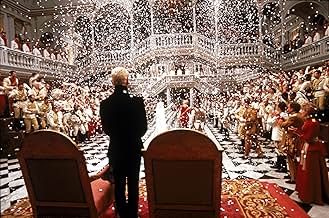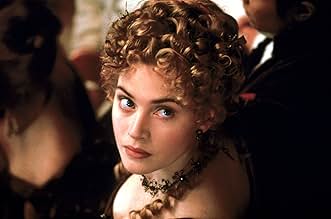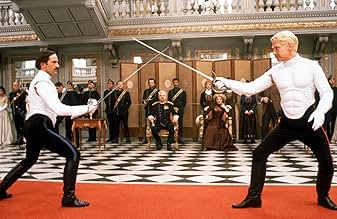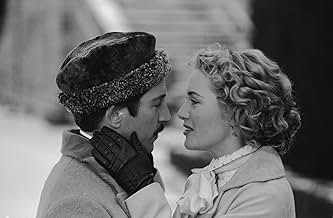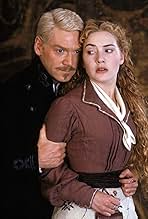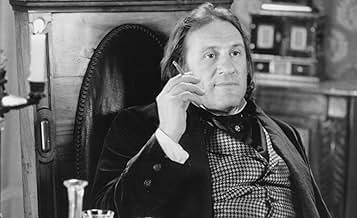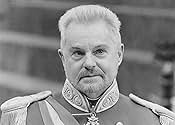IMDb रेटिंग
7.7/10
41 हज़ार
आपकी रेटिंग
अपनी भाषा में प्लॉट जोड़ेंHamlet, Prince of Denmark, returns home to find his father murdered and his mother remarrying the murderer, his uncle. Meanwhile, war is brewing.Hamlet, Prince of Denmark, returns home to find his father murdered and his mother remarrying the murderer, his uncle. Meanwhile, war is brewing.Hamlet, Prince of Denmark, returns home to find his father murdered and his mother remarrying the murderer, his uncle. Meanwhile, war is brewing.
- निर्देशक
- लेखक
- स्टार
- 4 ऑस्कर के लिए नामांकित
- 9 जीत और कुल 25 नामांकन
Rizz Abbasi
- Attendant to Claudius
- (as Riz Abbasi)
फ़ीचर्ड समीक्षाएं
seen one you've seen them all, right? wrong! I still like the sombre Olivier version and Gibson did well, but this is in a class of its own.
I finally realized with this expanded production set 200 years closer to the present the full message that Shakespeare cleverly concealed with the more prominent aspect of Hamlet's quandary, and that is he, Hamlet, is driven to distraction by the awareness its the insidiousness of human nature that created the conditions that saw his father murdered.
looking at the play with this insight you can see numerous scenes where this notion is there in the background. and by changing the era, Branagh shows yet again the astonishing applicability of that truth. all you need is to read a newspaper, something 'included' in this production.
thank god for British stage actors raised on Shakespeare.
a very rewarding viewing.
I finally realized with this expanded production set 200 years closer to the present the full message that Shakespeare cleverly concealed with the more prominent aspect of Hamlet's quandary, and that is he, Hamlet, is driven to distraction by the awareness its the insidiousness of human nature that created the conditions that saw his father murdered.
looking at the play with this insight you can see numerous scenes where this notion is there in the background. and by changing the era, Branagh shows yet again the astonishing applicability of that truth. all you need is to read a newspaper, something 'included' in this production.
thank god for British stage actors raised on Shakespeare.
a very rewarding viewing.
Part of the genius of Branagh's interpretation of Hamlet is in the use of the techniques of the cinema to enhance the production. Branagh has not condensed the acts like some mass market soup, as was done in Olivier's 1948 Oscar-winning production, or in, say, Zeffirelli's 1989 Hamlet lite starring Mel Gibson (both excellent, though, within their scope), but has kept every word while directing our understanding so that even those only casually familiar with the play might follow the intent and purpose with discernment. Recall that for Shakespeare--the ultimate actor's playwright who wrote with precious few stage directions--interpretation was left to the direction and the actors, an open invitation that Branagh rightly accepts.
The use of flashback scenes of things implied, such as the amorous union of Ophelia and her Lord Hamlet abed, or of a vast expanse of snow darkened with distant soldiers to represent the threat of Fortinbras' army from without, and especially the vivid remembrance in the mind's eye of the new king's dastardly deed of murder most foul, helps us all to more keenly appreciate just what it is that torments Hamlet's soul. I also liked the intense closeups. How they would have bemused and delighted an Elizabethan audience.
Branagh's ambitious Hamlet is also one of the most accessible and entertaining, yet without the faintest hint of any dumbing down or abbreviation. A play is to divert, to entertain, to allow us to identify with others who trials and tribulations are so like our own. And so first the playwright seeks to engage his audience, and only then, by happenstance and indirection, to inspire and to inform. Shakespeare did this unconsciously, we might say. He wrote for the popular audience of his time, a broad audience, it should be noted, that included kings and queens as well as knaves and beggars, and he reached them, one and all. We are much removed from those times, and yet, this play, this singular achievement in theatre, still has the power to transcend mere entertainment, to fuse poetry and story, as well as the high and the low, and speak once again to a new audience twenty generations removed.
Branagh himself is a wonderful Hamlet, perhaps a bit of a ham at times (as I think was Shakespeare's intent), a prince who is the friend of itinerant players. He also lacks somewhat in statute (as we conceive our great heroes); nonetheless his interpretation of the great prince's torment and his singular obsession to avenge his father's murder speaks strongly to us all. Branagh, more than any other Hamlet, makes us understand the distracted, anguished and tortured prince, and guides us to not only an appreciation of his actions, wild and crazy as they sometimes are, but to an identification and an understanding of why (the eternal query) Hamlet is so long in assuming the name of action. In Branagh's production, this old quibble with Hamlet's character dissolves itself into a dew, and we realize that he was acting strongly, purposely all the while. He had to know the truth without doubt so that he might act in concert with it.
I was also very much impressed with Derek Jacobi's Claudius. One recalls that Jacobi played Hamlet in the only other full cinematic production of the play that I know of, produced in 1980 by the BBC with Claire Bloom as Gertrude; and he was an excellent Hamlet, although perhaps like Branagh something less than a massive presence. His Claudius combines second son ambition with a Machiavellian heart, whose words go up but whose thoughts remind below, as is the way of villains everywhere.
Kate Winslet is a remarkable Ophelia, lending an unusual strength to the role (strength of character is part of what Kate Winslet brings to any role), but with the poor, sweet girl's vulnerability intact. She does the mad scene with Claudius as well as I have seen it done, and of course her personal charisma and beauty embellish the production.
Richard Briers as Polonius, proves that that officious fool is indeed that, and yet something more so that we can see why he was a counselor to the king. The famous speech he gives to Laertes as his son departs for France, is really ancient wisdom even though it comes from a fool.
Julie Christie was a delight as the besmirched and wretched queen. In the bedroom scene with Hamlet she becomes transparent to not only her son, but to us all, and we feel that the camera is reaching into her soul. She is outstanding.
The bit players had their time upon the stage and did middling well to very good. I liked Charlton Heston's player king (although I think he and John Gielgud might have switched roles to good effect) and Billy Crystal's gravedigger was finely etched. Only Jack Lemon's Marcellus really disappointed, but I think that was mainly because he was so poorly cast in such a role. Not once was he able to flash the Jack Lemon grin that we have come to know so well.
The idea of doing a Shakespearean play with nineteenth century dress in the late twentieth century worked wonderfully well, but I know not why. Perhaps the place and dress are just enough removed from our lives that they are somewhat strange but recognizable in a pleasing way. And perhaps it is just another tribute to the timeless nature of Shakespeare's play.
There is so much more to say about this wonderful cinematic production. It is, all things considered, one of the best Hamlets ever done. Perhaps it is the best. See it, by all means, see it for yourself.
(Note: Over 500 of my movie reviews are now available in my book "Cut to the Chaise Lounge or I Can't Believe I Swallowed the Remote!" Get it at Amazon!)
The use of flashback scenes of things implied, such as the amorous union of Ophelia and her Lord Hamlet abed, or of a vast expanse of snow darkened with distant soldiers to represent the threat of Fortinbras' army from without, and especially the vivid remembrance in the mind's eye of the new king's dastardly deed of murder most foul, helps us all to more keenly appreciate just what it is that torments Hamlet's soul. I also liked the intense closeups. How they would have bemused and delighted an Elizabethan audience.
Branagh's ambitious Hamlet is also one of the most accessible and entertaining, yet without the faintest hint of any dumbing down or abbreviation. A play is to divert, to entertain, to allow us to identify with others who trials and tribulations are so like our own. And so first the playwright seeks to engage his audience, and only then, by happenstance and indirection, to inspire and to inform. Shakespeare did this unconsciously, we might say. He wrote for the popular audience of his time, a broad audience, it should be noted, that included kings and queens as well as knaves and beggars, and he reached them, one and all. We are much removed from those times, and yet, this play, this singular achievement in theatre, still has the power to transcend mere entertainment, to fuse poetry and story, as well as the high and the low, and speak once again to a new audience twenty generations removed.
Branagh himself is a wonderful Hamlet, perhaps a bit of a ham at times (as I think was Shakespeare's intent), a prince who is the friend of itinerant players. He also lacks somewhat in statute (as we conceive our great heroes); nonetheless his interpretation of the great prince's torment and his singular obsession to avenge his father's murder speaks strongly to us all. Branagh, more than any other Hamlet, makes us understand the distracted, anguished and tortured prince, and guides us to not only an appreciation of his actions, wild and crazy as they sometimes are, but to an identification and an understanding of why (the eternal query) Hamlet is so long in assuming the name of action. In Branagh's production, this old quibble with Hamlet's character dissolves itself into a dew, and we realize that he was acting strongly, purposely all the while. He had to know the truth without doubt so that he might act in concert with it.
I was also very much impressed with Derek Jacobi's Claudius. One recalls that Jacobi played Hamlet in the only other full cinematic production of the play that I know of, produced in 1980 by the BBC with Claire Bloom as Gertrude; and he was an excellent Hamlet, although perhaps like Branagh something less than a massive presence. His Claudius combines second son ambition with a Machiavellian heart, whose words go up but whose thoughts remind below, as is the way of villains everywhere.
Kate Winslet is a remarkable Ophelia, lending an unusual strength to the role (strength of character is part of what Kate Winslet brings to any role), but with the poor, sweet girl's vulnerability intact. She does the mad scene with Claudius as well as I have seen it done, and of course her personal charisma and beauty embellish the production.
Richard Briers as Polonius, proves that that officious fool is indeed that, and yet something more so that we can see why he was a counselor to the king. The famous speech he gives to Laertes as his son departs for France, is really ancient wisdom even though it comes from a fool.
Julie Christie was a delight as the besmirched and wretched queen. In the bedroom scene with Hamlet she becomes transparent to not only her son, but to us all, and we feel that the camera is reaching into her soul. She is outstanding.
The bit players had their time upon the stage and did middling well to very good. I liked Charlton Heston's player king (although I think he and John Gielgud might have switched roles to good effect) and Billy Crystal's gravedigger was finely etched. Only Jack Lemon's Marcellus really disappointed, but I think that was mainly because he was so poorly cast in such a role. Not once was he able to flash the Jack Lemon grin that we have come to know so well.
The idea of doing a Shakespearean play with nineteenth century dress in the late twentieth century worked wonderfully well, but I know not why. Perhaps the place and dress are just enough removed from our lives that they are somewhat strange but recognizable in a pleasing way. And perhaps it is just another tribute to the timeless nature of Shakespeare's play.
There is so much more to say about this wonderful cinematic production. It is, all things considered, one of the best Hamlets ever done. Perhaps it is the best. See it, by all means, see it for yourself.
(Note: Over 500 of my movie reviews are now available in my book "Cut to the Chaise Lounge or I Can't Believe I Swallowed the Remote!" Get it at Amazon!)
First, what I didn't like. The acting was not really up to the Hamlet standard. Branagh was really over-the-top, doing a lot of yelling mostly. In my opinion, those actors who were not big-name celebrities generally did a better job; though I would except Billy Crystal and Robin Williams. (And Charlton Heston, too, but I wasn't sure if he was playing at being a hack.) A lot of the ambiguities in the play were clearly resolved one way in the flashbacks.
What I think speaks very much in this play's favor is that it is accessible. Shakespeare is hard to understand for the vast majority of people nowadays; many people are not even inclined to try, because of its reputation as Serious Literature and its archaic English. If they see this film they will understand clearly at least one man's interpretation of the play. They will be seeing it more as Shakespeare's audiences saw it: a play with sword fights and battles, and mighty kings and nobles, murder and incest and evil schemes and ghosts--and great art, if one cares to look for it, but in Shakespeare's day most didn't, any more than most people do now. Branagh's overacting, and his forcing of his interpretation of the story on the viewer, may detract from Shakespeare's art somewhat, but it is better that modern audiences get a piece of it, rather than nothing.
I've got to say one more thing though. Some people are complaining that "it's set in the 19th century and that wasn't Shakespeare's time". Well, in Shakespeare's time their costume and scenery was that of their own day for all of their plays. Shakespeare may have SAID it's in the days of ancient Rome or medieval Denmark or whatever, but he didn't dress his characters up like they were, he used the costumes of his own time. For the same reason his plays are full of anachronisms. For example, in King John the English and French have cannons--in Robin Hood's day. In Julius Caesar they talk of chimneys, which wouldn't be invented for another thousand years, and in Henry IV they talk about Machiavelli, who wasn't even born yet then. So I think this objection is silly--you might as well complain that the play isn't in Danish (after all they live in Denmark don't they?).
What I think speaks very much in this play's favor is that it is accessible. Shakespeare is hard to understand for the vast majority of people nowadays; many people are not even inclined to try, because of its reputation as Serious Literature and its archaic English. If they see this film they will understand clearly at least one man's interpretation of the play. They will be seeing it more as Shakespeare's audiences saw it: a play with sword fights and battles, and mighty kings and nobles, murder and incest and evil schemes and ghosts--and great art, if one cares to look for it, but in Shakespeare's day most didn't, any more than most people do now. Branagh's overacting, and his forcing of his interpretation of the story on the viewer, may detract from Shakespeare's art somewhat, but it is better that modern audiences get a piece of it, rather than nothing.
I've got to say one more thing though. Some people are complaining that "it's set in the 19th century and that wasn't Shakespeare's time". Well, in Shakespeare's time their costume and scenery was that of their own day for all of their plays. Shakespeare may have SAID it's in the days of ancient Rome or medieval Denmark or whatever, but he didn't dress his characters up like they were, he used the costumes of his own time. For the same reason his plays are full of anachronisms. For example, in King John the English and French have cannons--in Robin Hood's day. In Julius Caesar they talk of chimneys, which wouldn't be invented for another thousand years, and in Henry IV they talk about Machiavelli, who wasn't even born yet then. So I think this objection is silly--you might as well complain that the play isn't in Danish (after all they live in Denmark don't they?).
As a play, Hamlet is an anchor of civilization, and even moderately successful films are worth seeing. But in making the translation to film, the artist has two challenges.
The first concerns the work as drama. This is Shakespeare's most ambitious vision, one he tinkered with and enlarged both conceptually and literally. The purest choice, the only choice which can encompass the full weave of the work, is to include everything -- and that's what Branagh has done. Consequently, this work has extra dimensions of life. In doing so, he's included some nice touches:
--gone are superficial hints of mother-lust in the closet scene. These were never in the text.
--we are reminded that Hamlet's initial and sustaining anger is because his uncle jumped into the line of succession
--we see the hints that Hamlet was a student of Bruno in the book on witchcraft he consults after seeing the ghost. Also his book on `matters' (often thought to be Bruno's) is actually given to Ophelia. Nice. Shows deep research.
--Polonius is treated humanely, as more than a dottering fool. This makes Ophelia's loss (and earlier obedience) believable.
The second challenge is cinematic. The play was written for sparse settings; it translates naturally to audio tape and unnaturally to film. So the filmmaker has an open palette. Branagh makes some interesting choices. Many work extremely well, in particular the mirrors in the `to be' and Ophelia sequence. Others are strange:
--he introduces recognizable actors in secondary roles to jar us into the realization that this is a play. (One of these is really funny. How do you portray an actor among actors playing non-actors. Well, you get a noticeably BAD actor. I wonder if Heston knows he'll be goofed on for this for many decades as this film outlives his sandled perorations.)
--he introduces some almost satirical film reflections: a cheesy ghost, an Errol Flynn chandelier swing...
--he provides visual overlays for some of the images implied in the text: Hamlet's lovemaking, considerations in Norway, reflections of the players. This ruins a few of the important ambiguities but we do have a wealth to spend after all.
--in perhaps the worst loss of ambiguity, he makes Fortinbras an invader. This is done only to allow for some cinematic sweep at the end. Okay, I'll reluctantly buy it since the alternative is extended mugging in the death scenes.
I think Branagh and collaborators meet the first challenge nearly perfectly. As to the second challenge, this is our very best film version, in part because of extending the US tradition of playing the characters as real people (versus the UK tradition of characters as speechifiers). So far as the cinematic challenge, there are some great, really great visions here, but there are also some big cinematic misses which keeps this far from perfect. Until Greenaway attempts it, this is the best film Hamlet we have, and that simply makes it one of the best, most rewarding films ever. I'll bet Branagh tries again before he dies.
The first concerns the work as drama. This is Shakespeare's most ambitious vision, one he tinkered with and enlarged both conceptually and literally. The purest choice, the only choice which can encompass the full weave of the work, is to include everything -- and that's what Branagh has done. Consequently, this work has extra dimensions of life. In doing so, he's included some nice touches:
--gone are superficial hints of mother-lust in the closet scene. These were never in the text.
--we are reminded that Hamlet's initial and sustaining anger is because his uncle jumped into the line of succession
--we see the hints that Hamlet was a student of Bruno in the book on witchcraft he consults after seeing the ghost. Also his book on `matters' (often thought to be Bruno's) is actually given to Ophelia. Nice. Shows deep research.
--Polonius is treated humanely, as more than a dottering fool. This makes Ophelia's loss (and earlier obedience) believable.
The second challenge is cinematic. The play was written for sparse settings; it translates naturally to audio tape and unnaturally to film. So the filmmaker has an open palette. Branagh makes some interesting choices. Many work extremely well, in particular the mirrors in the `to be' and Ophelia sequence. Others are strange:
--he introduces recognizable actors in secondary roles to jar us into the realization that this is a play. (One of these is really funny. How do you portray an actor among actors playing non-actors. Well, you get a noticeably BAD actor. I wonder if Heston knows he'll be goofed on for this for many decades as this film outlives his sandled perorations.)
--he introduces some almost satirical film reflections: a cheesy ghost, an Errol Flynn chandelier swing...
--he provides visual overlays for some of the images implied in the text: Hamlet's lovemaking, considerations in Norway, reflections of the players. This ruins a few of the important ambiguities but we do have a wealth to spend after all.
--in perhaps the worst loss of ambiguity, he makes Fortinbras an invader. This is done only to allow for some cinematic sweep at the end. Okay, I'll reluctantly buy it since the alternative is extended mugging in the death scenes.
I think Branagh and collaborators meet the first challenge nearly perfectly. As to the second challenge, this is our very best film version, in part because of extending the US tradition of playing the characters as real people (versus the UK tradition of characters as speechifiers). So far as the cinematic challenge, there are some great, really great visions here, but there are also some big cinematic misses which keeps this far from perfect. Until Greenaway attempts it, this is the best film Hamlet we have, and that simply makes it one of the best, most rewarding films ever. I'll bet Branagh tries again before he dies.
Olivier, Kosentsev, Richardson, Coranado, Zefferelli, and Almerayeda have all directed Hamlet but Branagh's the only one who got it right.
This is the only film of "Hamlet" that contains the full four hours of William Shakespeare's masterpiece and gives a unique feel to the whole story.
Not many directors could pull this off without boring their audience but Branagh's skillful use of bravora film style and stunt casting allows people to see the importance of the scenes that are usually cut out.
Examples of this include Gerarde Depardue as Ranyaldo whos entire purpose in the film was to simply say "yes my lord" as Polonius asks him to spy on Leartes. This also included Billy Crystal as the grave digger, Robin Williams as Osric, Jack Lemmon as Marcellous, and Charlton Heston as the actor.
Branagh's performance of the Act 4 scene 4 soliloquy (Which again is usually cut out) is nothing short of c cinematic marvel as the camera slowly pulls back as the intensity grows. It is a scene that literally made me want to jump out of my chair and start applauding.
Branagh is the only film maker that understood the importance of every scene in this film and knew how to convey that importance to the general audience.
This is a must see for everyone who enjoy's good story telling, brilliant acting,and incredible direction. All of these part of William Shakespeares greatest triumph.
This is the only film of "Hamlet" that contains the full four hours of William Shakespeare's masterpiece and gives a unique feel to the whole story.
Not many directors could pull this off without boring their audience but Branagh's skillful use of bravora film style and stunt casting allows people to see the importance of the scenes that are usually cut out.
Examples of this include Gerarde Depardue as Ranyaldo whos entire purpose in the film was to simply say "yes my lord" as Polonius asks him to spy on Leartes. This also included Billy Crystal as the grave digger, Robin Williams as Osric, Jack Lemmon as Marcellous, and Charlton Heston as the actor.
Branagh's performance of the Act 4 scene 4 soliloquy (Which again is usually cut out) is nothing short of c cinematic marvel as the camera slowly pulls back as the intensity grows. It is a scene that literally made me want to jump out of my chair and start applauding.
Branagh is the only film maker that understood the importance of every scene in this film and knew how to convey that importance to the general audience.
This is a must see for everyone who enjoy's good story telling, brilliant acting,and incredible direction. All of these part of William Shakespeares greatest triumph.
क्या आपको पता है
- ट्रिवियाRobin Williams and Billy Crystal were not allowed to be on the set at the same time during filming, for fear they would crack up the cast and crew, and cause major production delays.
- गूफ़In the very long shot along the length of the throne room, the cameras are visible in the mirrors.
- इसके अलावा अन्य वर्जनTwo versions should have been theatrically released at the same time: a complete 242-minutes director's cut shown only in selected venues (large key cities) and a shorter, wide-release version that ran about two-and-a-half hours. After some critical backlash, Castle Rock decided to release the complete 4 hours everywhere in the US and use the shorter version for some overseas territories.
- साउंडट्रैकIn Pace
Music by Patrick Doyle
Performed by Plácido Domingo
Text for The Book of Wisdom
Text researched and adapted by Russell Jackson
Recorded at Studio 33, Hamburg, Germany
Engineered by Ambrogio Crotte and Luis Rodriguez
Original soundtrack available on Sony Classical Records
टॉप पसंद
रेटिंग देने के लिए साइन-इन करें और वैयक्तिकृत सुझावों के लिए वॉचलिस्ट करें
विवरण
- रिलीज़ की तारीख़
- कंट्री ऑफ़ ओरिजिन
- भाषा
- इस रूप में भी जाना जाता है
- William Shakespeare's Hamlet
- फ़िल्माने की जगहें
- उत्पादन कंपनियां
- IMDbPro पर और कंपनी क्रेडिट देखें
बॉक्स ऑफ़िस
- बजट
- $1,80,00,000(अनुमानित)
- US और कनाडा में सकल
- $47,08,156
- US और कनाडा में पहले सप्ताह में कुल कमाई
- $90,684
- 29 दिस॰ 1996
- दुनिया भर में सकल
- $62,96,790
- चलने की अवधि4 घंटे 2 मिनट
- रंग
- पक्ष अनुपात
- 2.20 : 1
इस पेज में योगदान दें
किसी बदलाव का सुझाव दें या अनुपलब्ध कॉन्टेंट जोड़ें




